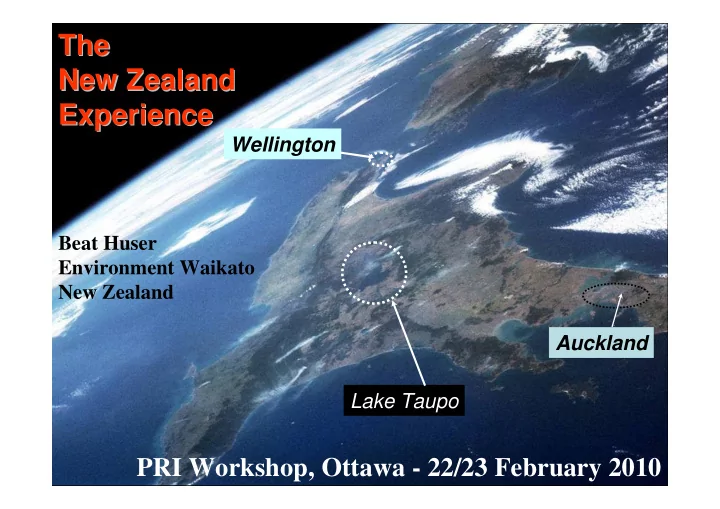

The The New Zealand New Zealand Experience Experience Wellington Beat Huser Environment Waikato New Zealand Auckland Lake Taupo PRI Workshop, Ottawa - 22/23 February 2010
What about New Zealand?
What we will cover New Zealand’s governance Role of central (federal) and local government Two projects: 1. Creating Futures project (strategic planning tools) 2. Protecting Lake Taupo (innovative policy) Concluding observations: – Role of federal (national/central) government – Science and policy interface
The Structure of Government Central Government Local Government Regional Councils Unitary Councils Combined Regional and City/District City District Councils Councils Councils Community
Central Government • Elected by the people (as a nation) • Decide national policy and make laws (social, cultural, economic and environmental) – for the whole of New Zealand • Supported by non-elected officials – Provide policy advice
Local Government Regional & City/District Councils Regional Councils (12) • Natural boundary based on watersheds • Core business - natural resource management air, land, water, coast District / City Councils (68) • Boundary based on community of interest • Core business - land use, economic development, service delivery water supply, sewerage, refuse collection, roading, parks
Central Government – Key Agencies Social Ministry of Social Development Ministry of Health Economic Environment Ministry for the Treasury Environment Reserve Bank Department of Ministry of Economic Conservation Development
Relationship Between Policy Instruments Prevent this (regulation) Sustainable Unsustainable Sustainable Unsustainable Encourage this (education/economic)
Part I – Creating Futures project Auckland Hamilton Strategic Planning Tools Waikato Taupo Region Wellington Christchurch
Waikato Region - what we manage • 25,000 km 2 total area • 400,000 people (10% of NZ) • $10 Billion GDP (10% of NZ) • 1,150 km coastline • Longest river, largest lake • $ 6 Billion Agriculture Export
15% Maori - and increasing
Vegetation Cover 1840 and Today Hamilton Hamilton Taupo Taupo Lake Lake Taupo Taupo Key Native forest, scrub and tussock
Land Use 56% pastoral farming plantation forestry 12% 28% indigenous vegetation and wetlands < 1% horticulture < 1% urban uses Waikato in 2050
Coromandel Residents – 25,000 Summer peak – 150,000
Whitianga in 1950s
Now - 2007
Future - 2030
Future - in 500 years … What people value: Whitianga 2500? “The natural environment and lifestyle the Coromandel offers”
We can’t predict the future …. The ‘futures landscape’ is one of shifting sands
Expected Future The path between the State Actual present and the future is Future Terrorist attack not clear and direct State Technology Development Energy ‘Failure’ of a Shock Pacific nation Present Economic downturn State Free trade with China
Creating Futures (2006 – 2010) Project Aim Develop and apply planning and communication tools to make informed choices for the future
Key Features LONG TERM planning 1. and enhanced strategic focus Environment Society 2. LINKING Science to Policy • Evidence-based • Informed decision-making Economy 3. INTEGRATION – Strategic partnerships Culture – Linking the four well-beings
Environmental Cultural WELL-BEINGS Economic Social
Project Structure Project Leader Advisory Group Central and local government OBJECTIVE 1: OBJECTIVE 2: Spatial decision support Improved communication & deliberation tools system development
Key Project Tools • Scenarios • Deliberation Process • Computer Model (Decision Support Systems) WISE
WISE (Waikato Integrated Scenario Explorer) • Stand-alone software application • System of interacting models
Source: RIKS 2006 Dynamic and Spatial Modelling Model library: Basic Framework Land use local level Regional interaction Transport Population (Age cohort) Geonamica Plant growth Product Climate WISE Hydrology Input – Output (Economy-Environment)
Interdisciplinary Goods Society Economy Labour Wastes Stewardship Services Resources Environment Stocks Flows Spatially-Explicit Dynamic
Multi-scale Place Local Region District (200 x 200 m cells)
NZ & WISE Beta External Drivers Climate Change Scenarios World External Sources NIWA System Design Region Hydrology Waikato Region Dynamic Economy- NIWA Environment Model NZCEE Water Quality NIWA District Demography Zoning UoW-PSC District Councils Local Land Use RIKS/LCR/EW SUITABILITY Biodiversity ACCESSIBILITY Spatial Indicators LCR LOCAL INFLUENCE GEONAMICA INTEGRATION - LCR Framework - RIKS LEAD
Source: Landcare Research & RIKS 2007 3 Mock Scenarios for Waikato’s Future 2001-2050 based on WISE Prototype Dairy Expansion Diversification Village Life Land for dairying Demand for non-dairy primary Residential land increases ~4% annually production land increases increases 7-fold Land Use Abandoned Bare Ground Broad-Acre Forestry Infrastructure Mine Indigenous Vegetation Pastoral - Dairy Pastoral - Other Other Primary Residential Water Wetland Utilities Services Manufacturing Construction
How WISE helps Environment Waikato • Explore alternative policy options for regional planning, assess trade-offs and prioritise issues • Regional development and sub-regional strategies (non- statutory) - Future Proof project • Cumulative effects of policy and permits (over space/time) • Up-to-date data and information • Access to expert knowledge from all disciplines
Lessons for successful interdisciplinary multi-agency science/policy collaboration (so far): Allow significant time at the start of a project to develop shared understanding, a holistic project vision and strong relationships End user engagement from the beginning is absolutely critical. Involve the ‘right people’ (champions, networkers, strategic thinkers) Develop uptake and implementation strategy to optimize end users buy-in through: Improving knowledge of tools Making tools relevant (case studies), useable and credible Provide support data management, training, model set-up Collaboratively identify and implement improvements
www.creatingfutures.org.nz
Thanks FRST – Foundation of Research Science & Technology Project team members Community Outcomes team Environment Waikato www.creatingfutures.org.nz
Recommend
More recommend